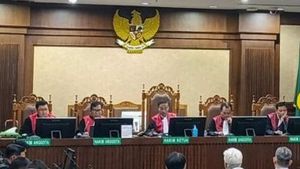YOGYAKARTA - The Covid-19 pandemic has had a significant impact on the world economy, including Indonesia. Various drastic changes in the socio-economic life of the community have changed the buying and selling interactions in the market.
Some industries have suffered deep downturns, others have benefited from the disaster, but as a whole the Indonesian economy has experienced quite a terrible contraction.
Therefore, various tactics have been and will be used to try to revive the economy while maintaining a consistent level of public health. The policies implemented by the government need to be analyzed again by looking at current economic conditions, estimates of vaccine innovation and distribution, and the time span of the benefits of the policy itself.
Currently, Indonesia's economic condition is not healthy. Economic growth according to the calculation of Year on Year in the first quarter of 2020 shows a weakening by only taking 2.97%. Data for the second quarter is also less friendly, showing a deep fall of -5.32%, the worst since 1999.
Most sectors experienced negative growth, such as the transportation industry which experienced the lowest growth with points of -30.84%. However, some sectors are still experiencing positive growth, such as the information and communication sector, financial services, agriculture, real estate, teaching services, health services, and water supply.
Therefore, it is very important to discuss the issue of the National Economy, Definition and Strategy of Government Policy. Here's the explanation.
National economy definition and strategy of government policiesBased on references from Bappenas, the National economy, although with a somewhat varied formulation, has been included in various statutory provisions. In the 1945 Constitution, especially Article 33, the economy is formulated as follows:
"The economy is structured as a joint effort based on the principle of kinship" (paragraph 1); "Production branches which are important to the state and which affect the livelihoods of the public shall be controlled by the state" (paragraph 2); "The land and water and the natural resources contained therein shall be controlled by the state and used for the greatest prosperity of the people" (paragraph 3).
These three paragraphs were contained both in the UUD45 before it was amended and in the 45 after it was amended. From these three verses, it actually implies the type of economic system adopted by Indonesia.
However, in the 1945 Constitution, after being amended, paragraph (4) which explicitly formulates the Indonesian economic system, namely "The national economy is organized based on economic democracy with the principles of togetherness, equitable efficiency, sustainability, environmental awareness, independence, and by maintaining a balance of progress and development. national economic unity ”.
Government Policy Strategy to restore the National EconomyNational economic recovery was carried out by adopting comprehensive fiscal and monetary policies. In addition, the Government has also allocated APBN funds for economic recovery amounting to Rp 695.2 trillion.
The national economic recovery is expected to be felt in the third quarter. Although it did not grow positively, as desired the national economy did not contract as much as the second quarter. Next in the fourth quarter, it is hoped that the national economy will grow positively so that the 2020 contraction can be minimized as little as possible. Meanwhile, in 2021, it is hoped that the national economy will experience a significant recovery.
To achieve the above objectives, there are three policies implemented, namely increasing domestic consumption, increasing business activities as well as maintaining economic stability and monetary expansion. This policy is carried out in parallel with the synergy between fiscal policy holders, monetary policy holders and related institutions.
One of the pioneers of the national economy, namely domestic consumption, the more consumption there is, the economy will move. Consumption is really related to people's purchasing capacity. Therefore, the Government has allocated a budget of IDR 172.1 trillion to support the consumption / purchasing capacity of the people. The funds are channeled through direct cash assistance, pre-work cards, electricity exemption and others.
In order to support national economic recovery, Bank Indonesia maintained stabilization of the Rupiah exchange rate, lowered interest rates, carried out purchases of Government Securities, and maintained macroeconomic stability and financial methods. The objective of lowering interest rates is to increase financial liquidity to support business activities.
* In addition to national economic understanding and government policy strategies, follow other domestic and foreign news only on VOI, Time to Revolutionize Preaching!
BERNAS OthersThe English, Chinese, Japanese, Arabic, and French versions are automatically generated by the AI. So there may still be inaccuracies in translating, please always see Indonesian as our main language. (system supported by DigitalSiber.id)












